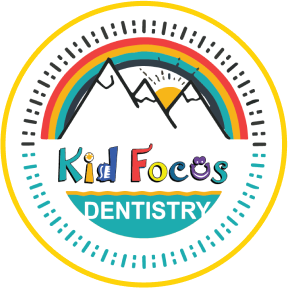Prenatal/Infant oral care in Wheat Ridge
Pregnant mother/prenatal:
Because a baby’s teeth are formed during the sixth week of pregnancy, we believe that caring for a child’s teeth starts with pregnant mothers. During pregnancy, a mother’s oral health care is important. The many changes that take place throughout that time, such as hormones, eating habits, indigestion, and acid reflux, can impact one’s oral health. Poor oral health can affect the health of a baby and can cause diseases such as tooth decay. Maintaining a healthy mouth throughout daily home care and regular professional dental care is crucial, and tooth decay is preventable.

Here are some steps that you can take to improve the health of your teeth and gums during pregnancy:
- Brush your teeth twice a day with fluoride toothpaste (Colgate, Crest, Aquafresh, etc.)
- Floss your teeth daily.
- Drink water or low-fat milk. Avoid soda, juice, and sweet beverages.
- Eat a healthy balanced diet.
- Avoid sugary snacks. Keep in mind that the more frequently you snack, the greater the chance of developing decay.
- Make an appointment to see your dentist. Now, more than any other time, an exam of your teeth and gums is needed. If your gums are tender, swollen, or bleed easily, you need to see your dentist as soon as possible. Gum disease can affect both your teeth and your baby’s teeth.
Coping with Morning Sickness:
Repeated vomiting can damage your teeth. To protect your teeth follow these steps:
- Eat small amounts of healthy non-sugary foods throughout the day
- Mix a teaspoon of baking soda in a cup of water to use as a mouth rinse after vomiting. This will help neutralize the acid in your mouth, then brush your teeth.
- Chew sugarless or xylitol-containing gum after eating.
- Maintain good oral hygiene. Brush your teeth at least two times a day with fluoride toothpaste.
Infant oral care:
Cleaning a baby’s mouth should be routine from the very start. After feeding, the baby’s gums and mouth should be wiped with one’s fingers wrapped in a soft, clean cloth. Also, putting anything into a baby’s mouth that has been in someone else’s, even the parents, should be avoided. Ex. Sharing a spoon after testing food, or cleaning a dropped pacifier by mouth.
Teething:
Around 6 months, sometimes sooner or later, a baby’s first teeth will begin to erupt. This will increase drooling and will cause mild irritability. To help sooth the baby a chilled, not frozen, a teething ring may be used. Or one can massage the baby’s gums. Nighttime might be difficult because there are less environmental distractions, so giving a child a dose of Motrin or Tylenol half an hour before bedtime is ok. Teething gels or teeth tablets that numb a baby’s gums are not recommended because of the toxicity potential.
Brushing:
When a baby’s first tooth erupts, it’s vital to begin brushing. We recommend a soft-bristled toothbrush that is age appropriate. Brush twice a day. If the child is off of formula it is recommended to use a smear (half a pea sized) of fluoridated toothpaste during brushing.
Childs first visit:
A baby should visit the dentist shortly after the first tooth appears and no later than the first birthday. At the first dental check-up, the dentist will examine the baby’s first teeth and mouth, determine the right amount of fluoride for each child, discuss feeding practices and the best prevention plan that fits each individual child.

Written By: Dr. Ngo
We made a very informative video that goes into details of how you can prepare yourself and your future child for a healthy dental future. We talk about subjects like diet habits, breastfeeding, and the obstacles of breast feeding.
In this video we go into depth about the importance of breastfeeding, as well as the challenges that may come with it, and how to overcome them. We also go into detail on oral habits from a dental perspective what we recommend parents stay away from, or what would help your child.
In this part two of the Infant/ Toddler care series we go into depth on how to overcome the struggles of teething and we provide all the tips you will ever need on how to prevent cavities.
For “TEETHING” just watch from the beginning
“CAVITY PREVENTION” fast forward to 2:24
In this video, we talk about all the oral habits that your kiddo might have that are detrimental to their growth and development. We go into detail on how to help your child break these habits:
Pacifier/Bottle, Thumb-sucking, Oral sensory, Sippy cup, and Dry lips.
For “PACIFIER/BOTTLE” fast forward to 19sec into the video
“THUMBSUCKING” fast forward to 5:17
“ORAL SENSORY” fast forward to 14:09
“SIPPY CUP” fast forward to 16:14
“DRY LIPS” fast forward to 17:15
LINK TO CHAP-STICK THAT WE RECOMMEND: https://www.amazon.com/IMAGE-Skincare…
LINK TO THE ORAL SENSORY TOYS WE RECOMMEND: https://kidfocusdentistry.com/oral-sen…
This video does a great explanation on ineffective and effective breastfeeding factors. It helps you visually see what lip tie and tongue tie in an infant may look like.


